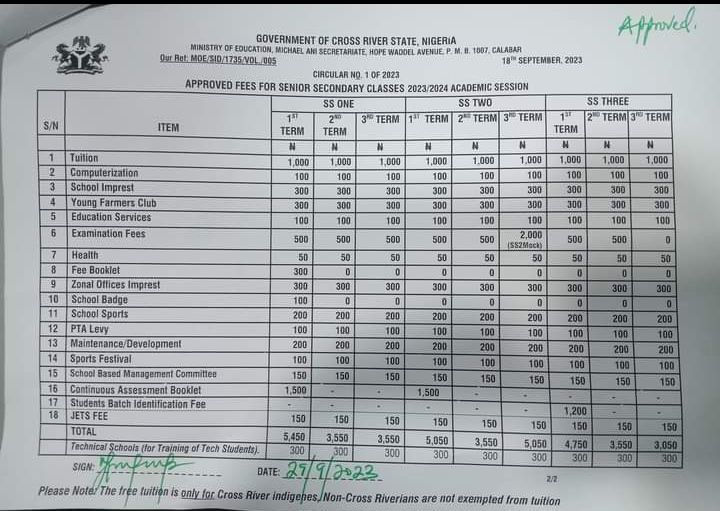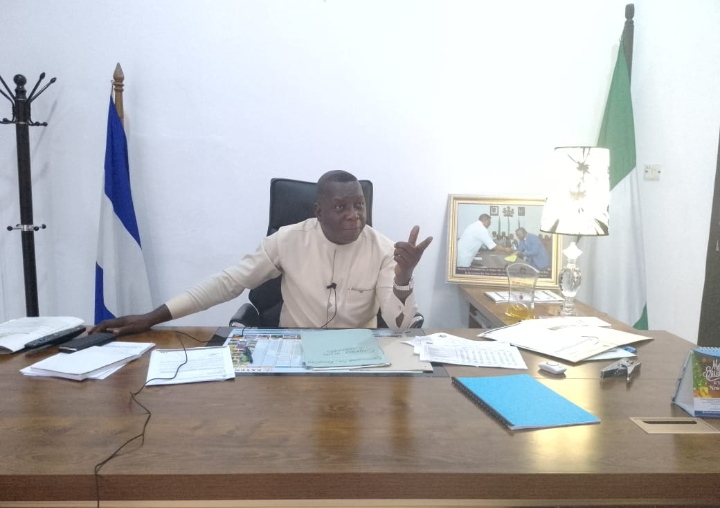By Patrick Obia
In 2006, the Cross River State Government signed into law for free education for all primary and secondary school students in the state. This move followed concerns about the high number of out-of-school students in the State.
Findings by CrossRiverWatch reveal that despite the existence of this law and public show of commitment to improve the education sector of the State, successive administrations have continued to make students pay to access education. And only recently, the Bassey Otu-led administration announced approved school fees for Junior and Secondary school students in the State.
Basic education is officially free and compulsory in Nigeria but over 10 million children between the age of 5 and 14 years are not in school. In Cross River, about one in every four children in the State is not attending school.
Despite the State passing compulsory, free, and universal basic education in 2006, the State government has been flouting its own law by asking the students to pay for basic education. Students are routinely driven away from school or denied the opportunity to sit for examinations due to their inability to pay fees, despite the State’s law making primary and junior secondary school free for all students.
With the increasing rate of fee-drive and other sundry levies going unabated, residents of Cross River have begun to ask questions about such fees.
To the dismay of many parents, the State government announced approved school fees for both junior and senior school students last September.
A breakdown of the fees shows that Junior Secondary School One (JSS 1) and JSS 2 will be paying N10,000 annually as tuition fees while JSS 3 students will pay more than N11,000.

The State government claimed that the approved fees were to checkmate the illegal charges by teachers and headteachers. But teachers and headteachers in Calabar South and Calabar Municipal who spoke with CrossRiverWatch accused the government of benefiting from the multiple levies on pupils and students.
A head teacher of a school who spoke on the condition of anonymity due to fear of victimization, said the fees are now higher than before.
“Booklets the students used to buy twice, one in JSS and another in SS, now the students are expected to buy result booklets for each class,” the teacher said.
Nothing Like Free Education In Cross River
Atycare Initiative, a non-profit organization with a vision of sending children back to school, urged the government to come clean on the situation with the free education promised to students in the State.
The organization which has sent over five thousand children back to school in Cross River State for the past few years through outreaches said, “There is no free education in the State”.
“I don’t want to hear anyone say free education because there is none; I don’t know if it was political talk or not,” said Atim Eso, executive director of Atycare Initiative.
“Early this year, I went to pay common entrance fees for some children and we saw some driven out of school,” Eso said. Adding: “They were at the gate and many. There are times we go for outreach and most times you see scanty classrooms because of fees.”
Atim called on the government to come out plain through its implementation of the acclaimed no-free education. “If they are saying tuition is free and the children are paying for tissues, brooms and whatever, can’t it be a minimum amount?”
However, the Commissioner of Education in the State, Senator Stephen Odey blamed Nigeria’s economy for the charges on students.
He said lack of manpower in the public schools has led to some of the charges whereby pupils and students pay N1,000 every term to hire extra subject teachers or school guards.

“When schools discover that they need some key teachers and core subjects like mathematics, science teachers and others, and a population of about a thousand in a school, so they engage a part-time teacher and they will write to us that we lack these core areas and would like to engage a part-time teacher and we want to collect N1,000 per term per child to enable us to pay them,” Odey said.
“When we look at it objectively, they will open Parents Teachers Association (PTA) accounts where this money will be domiciled within the school so that at the end of the day, the number of those part-time teachers’ money will be used to pay them, it comes from the levies.”
Odey insisted that such fees have become a tradition in the State’s Ministry of Education.
This investigation is produced with support from Civic Media Lab.
This report was republished from CrossRiverWatch.





